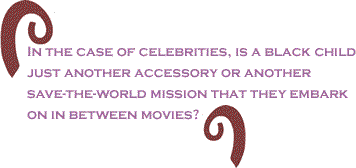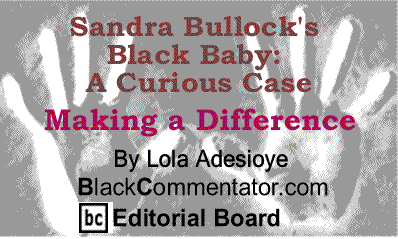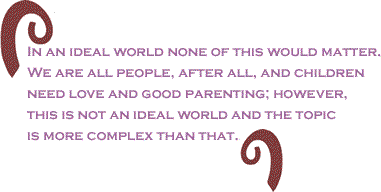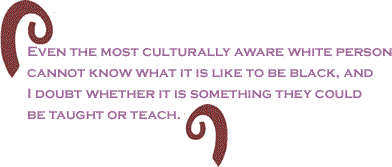
|
||||||||||||||||||||||
|
||
 |
||
First,
it was Angelina
Jolie and Brad
Pitt. Then it was Madonna.
Now Sandra Bullock has
joined the collective of celebrities adopting black babies. As
Bullock's case shows, a white celebrity adopting a black child raises
questions as well as suspicions. Why do they want a black baby as
opposed to a white one, when there are also white kids who are up
for adoption? Are they buying in to the idea that poor black children
must be saved by altruistic white people (ironically, one of the
themes in Bullock's latest movie 'Blindside')?
Or in the case of celebrities, is a black child just another accessory
or another save-the-world mission that they embark on in between
movies?
This is where the issue of the cultural and psychological impact
of trans-racial adoption comes in to play. Again we are led to ask
more questions: What are, for example, the cultural implications
for a black child that is raised by a white family? Do they struggle
to find themselves?
There is definitely something to be said for the importance
of a deep-rooted sense of culture and heritage and growing up around
other people who look like you. It can be hard for someone who is
not black to really grasp exactly what that means and how important
that is for a person's psyche. Even the most culturally aware white
person cannot know what it is like to be black, and I doubt whether
it is something they could be taught or teach. Hopefully, Bullock
has some great black people in her life who can connect with the
child and provide that for him.
Black children are over represented in the adoption system,
making up 32 percent of all children in foster care (compared to
40 percent who are white), despite black people being in significantly
smaller numbers in the general population. They stay longer in the
system, tend to experience multiple placements and find it harder
to be placed with one permanent family. In light of that, is this
really a case worth debating at all? Isn't it better for children
of any race to go to a good home rather than spend their lives in
foster care? BlackCommentator.com Editorial Board member Lola Adesioye is a, writer, socio-political thought leader and, activist. Her grandfather was one of the forefathers of journalism in Nigeria. She holds a master�s degree in Social & Political Science from Cambridge University. Lola�s writing covers topics such as race and African-American culture from a black British perspective, American politics, music, women�s issues and travel. . Her blog is. lolacreative.com . She writes a weekly column for The Guardian Online. You can also visit her on twitter, facebook andyoutube. Click here to contact Ms. Adesioye. |
||
If you would like to comment on this article, please do so below. There is a 400 character limit. You do not need a FaceBook account. Your comment will be posted here on BC instantly. Thanks. Entering your email address is not mandatory. You may also choose to enter only your first name and your location.
|
||
Thank you very much for your readership. |
||
| Any BlackCommentator.com article may be re-printed so long as it is re-printed in its entirety and full credit given to the author and www.BlackCommentator.com. If the re-print is on the Internet we additionally request a link back to the original piece on our Website. | ||
| |
||
May 6, 2010 |
| Executive Editor: David A. Love, JD |
| Managing Editor: Nancy Littlefield |
| Publisher: Peter Gamble |
| Est. April 5, 2002 |
| Printer Friendly Version in resizeable plain text format |
 |
 |
 |

|
 |
| |
| |















































